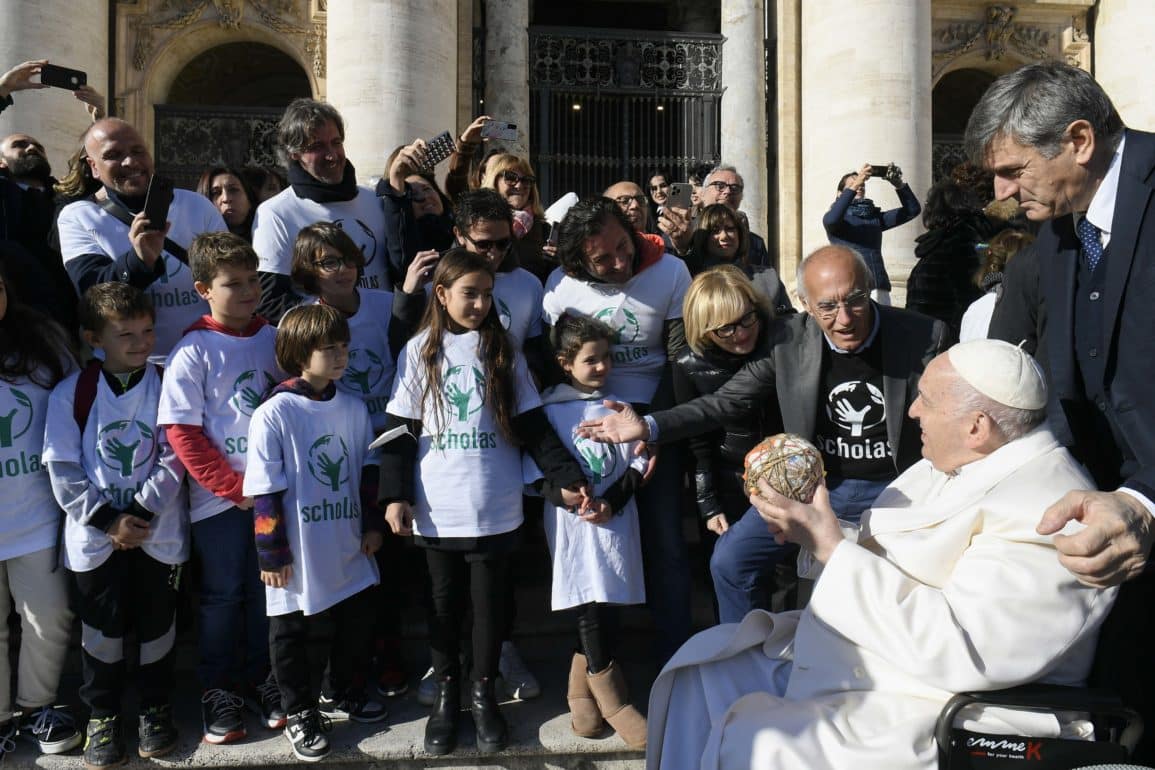This morning’s General Audience occurred at 9:00 a.m. in St. Peter’s Square, where the Holy Father Francis met with groups of pilgrims and faithful from Italy and from all over the world.
In his address in Italian, the Pope, resuming the cycle of catechesis on Discernment, focused his meditation on the theme: “Authentic Consolation” (Reading: Phil 1:9-11).
After summarizing His catechesis in the different languages, the Holy Father addressed special expressions of greeting to the faithful present.
The General Audience concluded with the recitation of the Pater Noster and the Apostolic Blessing.
Catechesis on discernment, 10. True consolation
Dear brothers and sisters, good morning!
As we continue our reflection on discernment, and in particular on the spiritual experience called “consolation”, let’s ask: how can we recognize authentic consolation? It is a very important question for a good discernment, so as not to be deceived in the search for our true good.
We can find some criteria in a passage from the Spiritual Exercises of Saint Ignatius of Loyola. He says: “We ought to note well the course of the thoughts, and if the beginning, middle and end is all good, inclined to all good, it is a sign of the good Angel; but if in the course of the thoughts which he brings it ends in something bad, of a distracting tendency, or less good than what the soul had previously proposed to do, or if it weakens it or disturbs the soul, taking away its peace, tranquillity and quiet, which it had before, it is a clear sign that it proceeds from the evil spirit, enemy of our profit and eternal salvation”.
They are valuable indications, that merit a brief comment. What does it mean that the beginning is inclined to good? For example, I have the thought of praying, and I note that it accompanies affection towards the Lord and neighbour, it invites gestures of generosity, of charity: it is a good beginning. It can instead happen that such a thought emerges to avoid a job or task that has been entrusted to me: every time I have to wash the dishes or clean the house, I have a strong urge to pray! But prayer is not an escape from one’s tasks; on the contrary, it us an aid in realizing the good we are required to do, here and now. This regards the beginning.
Then there is the middle, that is to say what comes afterwards, what follows that thought remaining with the previous example, if I begin to pray and, like the Pharisee in the parable (cf. Lk 18:9- 14), I tend to be self-satisfied and to disdain others, perhaps with a resentful and sour spirit, then these are signs that the evil spirit has used that thought as a key to enter into my heart and to transmit his feelings to me.
And then there is the end. The end is an aspect we have already encountered, namely: where does that thought take me? For example, it can happen that I work hard for a good and worthy task, but this pushes me to stop praying; I find I am increasingly aggressive and angry, I feel that everything depends on me, to the point of losing confidence in God. Here, evidently, there is the action of the evil spirit.
The style of the enemy – we know – is to present itself in a devious, masked way: he starts from what is most dear to us and then, little by little, reels us in: evil enters secretly, without the person being aware of it. And with time, gentleness becomes hardness: that thought reveals itself for what it truly is.
Hence, the importance of this patient but indispensable examination of the origin and the truth of our thoughts; it is an invitation to learn from experiences, from what happens to us, so as not to continue to repeat the same errors. The more we know ourselves, the more we sense where the evil spirit enters, his “password”, the entrance to our heart, which are the points to which we are most sensitive, so as to pay
attention to them in the future.
The examples could be multiplied at will, reflecting on our days. This is why a daily examination of conscience is so important: it is the valuable effort of rereading experience from a particular point of view. Noticing what happens is important, it is a sign that God’s grace is working in us, helping us to grow in freedom and awareness.
Genuine consolation is a sort of confirmation that we are doing what God wants of us, that we are walking on his paths, that is, on the paths of life, joy, and peace. Discernment, in fact, is not simply about what is good or the greatest possible good, but about what is good for me here and now: this is what I am called to grow on, setting limits to other proposals, attractive but unreal, so as not to be deceived in the search for the true good.
Greetings
I greet the English-speaking pilgrims taking part in today’s Audience, especially those from England, Australia, Vietnam, and the United States of America. I pray that each of you, and your families, may experience a blessed Advent in preparation for the coming, at Christmas, of the newborn Jesus, Son of God and Saviour of the world. God bless you!










